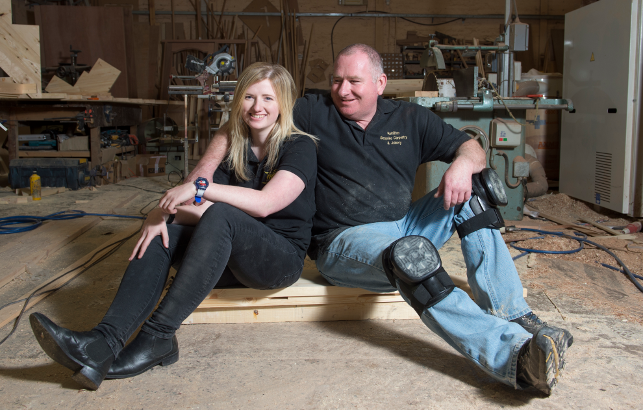
Victoria Hamilton, the creator of the Recoil Kneepad, with her dad, a joiner who is wearing the product. He was her initial inspiration as he often complained about sore knees
The bee’s knees
Joiners, tilers, floorers, plumbers and others who spend most of their working lives on their knees know all too well the toll it can take. In some instances, it could even result in a change in career.
Recoil Kneepads, which has been designed, developed and brought to market by young entrepreneur Victoria Hamilton, and features a pressure absorbing spring suspension system, aims to protect knees when kneeling to reduce the possibility of long term damage.
In fact, the inspiration for the kneepads came from her dad. “Dad comes home complaining of sore knees and joints. We’re sitting having dinner and I ask him what can I do for my final year design project. He jokes, why don’t you design me some new knee pads,” says Hamilton.
So in 2012 she decided to redesign the kneepad as part of her Product Design Engineering course at Strathclyde University. Brainstorming with classmates led to the creation of the double layer, spring system that would distribute weight evenly across the knee joint and reduce pain.
As her project developed and upon advice from her project supervisor, she entered business competitions to take the design further. She entered the Santander Universities Entrepreneurship Awards and the Young Innovators Challenge competition, winning £55,000 in total.
This enabled her to work with Edinburgh design agency i4 Product Design to take the product through prototyping. Following testing and further refinement to the design in SolidWorks, she began looking for manufacturers and decided to have iher Recoil kneepad made in the UK.
With cash flow running low, Hamilton and her small team chose to assemble the stock themselves in her parents’ garage. As well as the UK, Recoil have recently had sales in Australia and the US.
“We’re still only at the start of our journey and have a lot to do to grow our brand. We want to change the thinking of Personal Protective Equipment (PPE),” says Hamilton.
“We’ve had many customers email telling us that our product has saved them from having to change occupation and allowed them to earn a livelihood! For us, this is what it’s all about, and as long as people ask us to continue to provide new and innovative PPE we will continue to sell our knee pads and diversify into other products as required by our customers.”
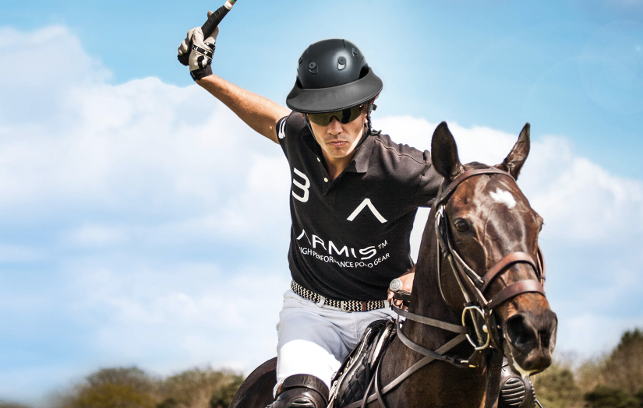
The Armis polo helmet combines MIPS (Multi-directional Impact Protection System) patented technology that adds a low friction layer between the head and the helmet
Horses for courses
When looking for inspiration for his final year Industrial Design and Technology project at Loughborough University in 2015, Robin Spicer drew on personal experience – his love for polo and the fact that he’d fallen off his horse countless times, even being knocked unconscious.
“I wanted to apply my design flair to a sport that has been left behind in the safety industry and bring it into the 21st Century,” he says.
Within eight months, Spicer had created and refined his design using SolidWorks and the university’s in-house 3D printing facilities, not to mention research and user testing carried out at his local polo club.
“The design has two shells – carbon fibre and fibre glass to reduce penetrations combined with a lightweight expanded polystyrene liner to absorb the energy from a crash. The liner is fitted with a thin polycarbonate MIPS layer (Multidirectional Impact Protection System) to reduce rotational acceleration. A flexible peak covered in leather is incorporated with a four point harness to reduce neck injuries,” explains Spicer.
Following graduation, Spicer decided to take his design further and it has recently gone into production.
“We are very proud to be manufacturing in the UK certified to British Standards unlike so many other consumer goods we see today. This means we can offer a greater level of quality control and make the best product,” he says.
“My ambition is to create more products for the equestrian market so I can combine my passion for both design and horses.”
armispolo.com
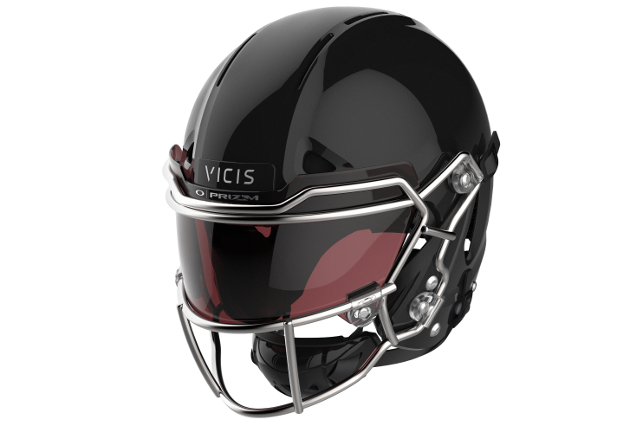
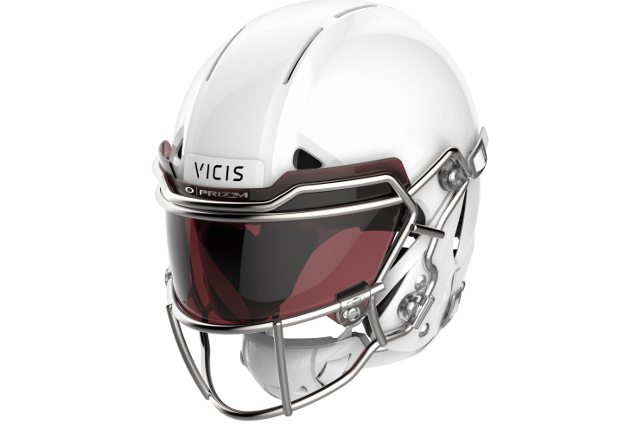
The Zero1 football helmet from VICIS features an Edge shield lens exclusively created by Oakley
Face value
VICIS is a new Seattle-based sports technology brand with a disruptive helmet technology that is aiming to reduce concussions in the National Football League (NFL).
It started three and a half years ago when VICIS’ three founders came together to create an improved football helmet. However, none of them had any specific experience in helmet design.
“I’ve been interested in helmets for quite some time. Watching football and seeing those collisions and their eff ects, it became harder for me to truly enjoy. Hearing the cracking sound on television and observing the stuff in person, that was enough motivation right there,” says Per Reinhall, an entrepreneur who trained as a mechanical engineer.
He began working with neurosurgeon Sam Brown and DaveMarver, whose background is in the medical technology field. “We all had the same goal of protecting kids because in our minds, it’s a social health problem. Eventually one thing lead to another and here we are today,” says Reinhall.
They put a team of engineers together, who took an original approach to the helmet’s construction.
The main difference from traditional helmets is that the ZERO1 yields or deforms on impact. It features a soft outer shell and an underlying layer of columns designed to mitigate collisions from multiple directions.
In terms of its aesthetic, VICIS worked with Seattle industrial design firm Artefact. Following user research, the design team came up with a design that is bold yet classic.
Of course, testing played a critical role in the development process and VICIS built its own in-house ‘Smash Lab’ where its two test engineers (aff ectionately known as the ‘Smash Brothers’) would spend their days designing and executing tests that demonstrate the durability and efficacy of the helmet.
ZERO1 has launched and such has been its popularity that VICIS is already taking reservations for next year’s NFL season. But there is still more to come, as Reinhall says, “This is just version one of the helmet — there’s high energy at VICIS to optimise every component and continue optimising manufacturing and materials, and engineer an improved version of the helmet.”
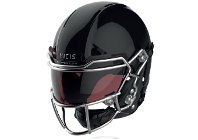
Armour for all with three new protective products
Default






